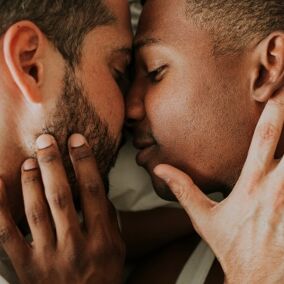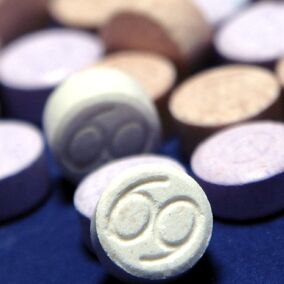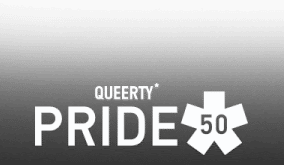
To honor National HIV Testing Day and just plain great storytelling, Raif Durrazi chatted with longtime Queerty contributor Mark King about his book, My Fabulous Disease: Chronicles of a Gay Survivor.
RAIF: You’ve just released a book, Mark. First, thank you for your continuous generosity of spirit, honesty, and willingness to talk with me.
MARK: You’re welcome, Raif. I’m more than happy to talk about, well, me.
You’ve just published My Fabulous Disease: Chronicles of a Gay Survivor. For those unfamiliar with you and your work (for shame), why do you coin your book and blog my fabulous’ disease?
How about we take this to the next level?
Subscribe to our newsletter for a refreshing cocktail (or mocktail) of LGBTQ+ entertainment and pop culture, served up with a side of eye-candy.
Years ago, before the internet or blogs, I wrote a column for the gay papers about life as a gay man with HIV. I was tired of all the negative baggage that was, and still is, thrust upon those of us who are positive. The presumptions and the judgments, how we are viewed as inherently untrustworthy, that sort of thing. I decided that if the virus lived in my body, it would take on my characteristics, not vice versa. And my dear, I am f(*&&ng fabulous. So, it became My Fabulous Disease. The name seemed far more provocative years ago than it does now.

In addition to HIV, you talk about addiction, sex, family, and navigating life. What do you hope someone might walk away with after reading your words?
I hope they have a better idea of how life feels to people like me and laugh out loud at points along the way. I have always shied away from making grand pronouncements about what it all means. I have no idea. I’m just telling stories with as much honesty as I can muster.
You’ve written about things I’ve never talked with anyone about or thought to even talk about, insecurities, or self-reflection. It’s reassuring to know someone I respect has had some of the same internal dialogues as I have.
Thanks. We’re all having those conversations with ourselves, aren’t we? I do it constantly, and it’s usually about what other people might think about me or if I’m a terrible person for one reason or another. For instance, I enjoy the spotlight. Like, a lot. Look, Mom, I’m in Queerty again! Some book reviewers have pointed out that it’s often the story of a frustrated performer trying to find a stage, any stage, and ultimately finding his purpose as an outspoken gay man and activist. That’s fair and true. I found some meaning to go along with my craven lust for attention, and that’s perfectly okay. I remember thinking, years ago, that I guess I wasn’t going to get on TV as an actor, but instead as a guy with HIV, and deciding, “Well, okay, I’ll take it.” My life is often about steering my selfishness into something purposeful.
You have so much experience and wisdom as evidenced in your book. I’ll never forget your quip about having antibodies older than I’ve been alive (which is true; you were diagnosed in 1985, for those who are counting). How do we keep our multi-generations connected and learning from one another?
That’s always been challenging for gay men, and we have our sexualized culture and instincts to thank for it. We don’t trust one another very much. How does any older gay man mentor a younger person and build a relationship based on mutual trust? Older gay men are often viewed as predatory vis-a-vis their interactions with younger gays. Did you notice how I just used vis-a-vis properly and casually? Anyway, it isn’t impossible, and I certainly had older mentors when I was young, but they had to break through the initial presumptions of sex—context matters. I’ve met plenty of younger guys through community work and recovery stuff, and it’s been great for all of us. I’ve loved guiding you through some of your initial time in the HIV movement, Raif. I love being a cheerleader for the newbies.
I often had to stop reading your book to Google the names of people, places, and events… and sometimes a saying, like “My dance card is full.” If your stories were anything but captivating, I wouldn’t have bothered. Maybe there’s an answer to how we engage younger audiences to learn about our collective history.
That’s my way into whatever point or observation I’m trying to make. It’s always about the story first. For example, telling a story about a youthful douching disaster I had during sex after my first try using a shower shot — well, I’ll let you imagine it for now, but the details are in that story — is a funny, outrageous story. That’s enough, even though it can also be viewed as how shame-based our sexual lives can be, how we must learn the mechanics of sex sometimes through trial and error, and it’s part of our lives. I hope my story entertains but might also relieve anyone who has been there. But that didn’t answer you, Raif. Please tell me my book doesn’t need Siri to help translate.
When I went to my first HIV conference, USCHA 2019, you were there to greet me with open arms, the welcome party to the HIV community. What’s the importance of that dynamic for the HIV community? for the gay community?
You had found one of your tribes. We have many. I was glad to meet you and knew immediately that your bodybuilding as a person living with HIV was a compelling story. It didn’t hurt that you had not yet discovered shirts. And see? There I go, sexualizing you, as evidence that the balance between admiration and exploitation is so delicate. But yes, for sure, if we start from a place of knowing everyone has to deal with fear and we all seek acceptance, then we’ll be much kinder to the new kid on the block.
Your storytelling has a level of vulnerability and transparency that almost feels dangerous today. It’s not quite P.C.; it lacks trigger warnings and conflicting morality. What is the value of presenting yourself in this way?
I can’t do it any other way. What’s the point of writing it if I make myself pretty and don’t reveal it? The most obvious example is a story about seeking out sex with adult men when I was an early teen and watching one of those men have a breakdown after we had sex. The tale describes my complete confusion over why he was sobbing in the car as he drove me home. Today, I still struggle with understanding it. The story shows you what happened and what it felt like in those moments. You can draw your moral arguments, and plenty of readers have.
You share things that anyone might be afraid to share for fear of being judged, rejected, and yet I find that I love you more for it. It’s a tribute to you, and it also begs the question, if I could positively react to you, then maybe someone would afford me that same grace for being so open.
We’re all afraid to reveal too much. I have the privilege of not having, or maybe not caring, about any consequences for that. I don’t take that lightly.
Part of me feels silly, young, and ignorant to be conversing with you about so many things outside of my experience/expertise. Still, I guess that’s why we should have these kinds of discussions.
You’re doing fine, Raif. Maybe we all need to hear that more. I look back at my youthful choices and actions during a sometimes traumatic time, and I want to tell that guy that he conducted himself with great integrity and courage. It’s not what you think you know. It’s how you act. You’re doing great from my vantage point, Raif. Give yourself a break. Trust me, I know that’s hard. Maybe you can’t hear it, like I couldn’t listen to it then, either. I wish I could thump you on the head and convince you that you’ll be proud of yourself, on balance, years from now. But I bet you will.
Don't forget to share:











































Rueerty
Does Mark & Raif have IG?